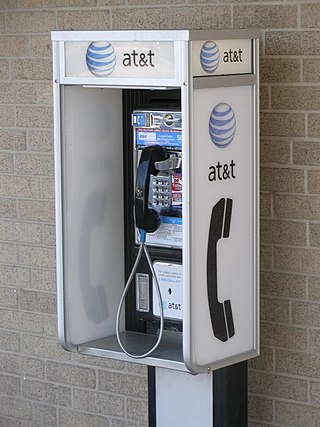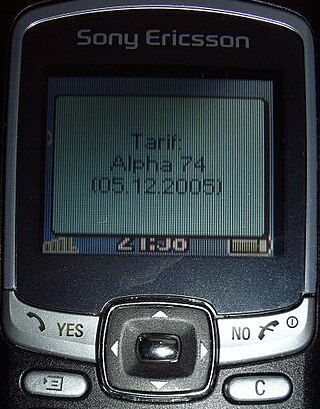
A telephone card, calling card or phonecard for short, is a credit card-size plastic or paper card used to pay for telephone services. It is not necessary to have the physical card except with a stored-value system; knowledge of the access telephone number to dial and the PIN is sufficient. Standard cards which can be purchased and used without any sort of account facility give a fixed amount of credit and are discarded when used up; rechargeable cards can be topped up, or collect payment in arrears. The system for payment and the way in which the card is used to place a telephone call vary from card to card.

A payphone is typically a coin-operated public telephone, often located in a telephone booth or in high-traffic public areas. Prepayment is required by inserting coins or telephone tokens, swiping a credit or debit card, or using a telephone card.

A SIM card is an integrated circuit (IC) intended to securely store an international mobile subscriber identity (IMSI) number and its related key, which are used to identify and authenticate subscribers on mobile telephone devices. Technically the actual physical card is known as a universal integrated circuit card (UICC); this smart card is usually made of PVC with embedded contacts and semiconductors, with the SIM as its primary component. In practice the term "SIM card" refers to the entire unit and not simply the IC.
A collect call in Canada and the United States, known as a reverse charge call in other parts of the English-speaking world, is a telephone call in which the calling party wants to place a call at the called party's expense.

A telephone call or telephone conversation, also known as a phone call or voice call, is a connection over a telephone network between the called party and the calling party. Telephone calls started in the late 19th century. As technology has improved, a majority of telephone calls are made over a cellular network through mobile phones or over the internet with Voice over IP. Telephone calls are typically used for real-time conversation between two or more parties, especially when the parties cannot meet in person.
A toll-free telephone number or freephone number is a telephone number that is billed for all arriving calls. For the calling party, a call to a toll-free number from a landline is free of charge. A toll-free number is identified by a dialing prefix similar to an area code. The specific service access varies by country.

A conference call is a telephone call in which someone talks to several people at the same time. The conference call may be designed to allow the called party to participate during the call or set up so that the called party merely listens into the call and cannot speak.
Phone fraud, or more generally communications fraud, is the use of telecommunications products or services with the intention of illegally acquiring money from, or failing to pay, a telecommunication company or its customers.

Unstructured Supplementary Service Data (USSD), sometimes referred to as "quick codes" or "feature codes", is a communications protocol used by GSM cellular telephones to communicate with the mobile network operator's computers. USSD can be used for WAP browsing, prepaid callback service, mobile-money services, location-based content services, menu-based information services, and as part of configuring the phone on the network. The service does not require a messaging app, and does not incur charges.

A business telephone system is a telephone system typically used in business environments, encompassing the range of technology from the key telephone system (KTS) to the private branch exchange (PBX).
GSM services are a standard collection of applications and features available over the Global System for Mobile Communications (GSM) to mobile phone subscribers all over the world. The GSM standards are defined by the 3GPP collaboration and implemented in hardware and software by equipment manufacturers and mobile phone operators. The common standard makes it possible to use the same phones with different companies' services, or even roam into different countries. GSM is the world's most dominant mobile phone standard.

A prepaid mobile device, also known as a pay-as-you-go (PAYG), pay-as-you-talk, pay and go, go-phone, prepay or burner phone, is a mobile device such as a phone for which credit is purchased in advance of service use. The purchased credit is used to pay for telecommunications services at the point the service is accessed or consumed. If there is no credit, then access is denied by the cellular network or Intelligent Network. Users can top up their credit at any time using a variety of payment mechanisms.
In telecommunications, a long-distance call (U.S.) or trunk call is a telephone call made to a location outside a defined local calling area. Long-distance calls are typically charged a higher billing rate than local calls. The term is not necessarily synonymous with placing calls to another telephone area code.

Prepaid refers to goods and services paid for in advance. Examples include postage stamps, attorneys, tolls, public transit cards like the Greater London Oyster card, pay as you go cell phones, and stored-value cards such as gift cards and preloaded credit cards.
A feature group, in North American telephone industry jargon, is most commonly used to designate various standard means of access by callers to competitive long-distance services. They defined switching arrangements from local exchange carriers central offices to interexchange carriers. These arrangements were described in an official tariff of the National Exchange Carrier Association, filed with the Federal Communications Commission (FCC).
International telephone calls are those made between different countries. These telephone calls are processed by international gateway exchanges (switches). Charges for these calls were high initially but declined greatly during the 20th century due to advances in technology liberalization. Originally they were placed via long-distance operators. The calls were transmitted by cable, communications satellite, radio, and more recently, fiber optics and Voice over Internet Protocol (VoIP). International direct dialling was introduced in the 1970s, so calls can be dialed by country code without an operator.

The New Zealand telephone numbering plan describes the allocation of telephone numbers in New Zealand and the Pitcairn Islands.

Mahanagar Telephone Mauritius Limited (MTML) is a division of Mahanagar Telephone Nigam Limited which specialises in telecommunications and Internet services currently operational in Mauritius. MTML was founded in 2003 as a division of Mahanagar Telephone Nigam Limited (MTNL).
A virtual number, also known as direct inward dialing (DID) or access numbers, is a telephone number without a directly associated telephone line. Usually, these numbers are programmed to forward incoming calls to one of the pre-set telephone numbers, chosen by the client: fixed, mobile or VoIP. A virtual number can work like a gateway between traditional calls (PSTN) and VoIP.
A rechargeable calling card or a recharge card is a type of telephone card that the user can "recharge" or "top up" by adding money when the balance gets below a nominated amount. In reality the rechargeable calling card is a specialised form of a prepaid or debit account.










